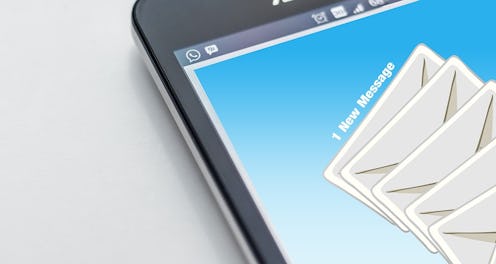Life
Email Personality Types Are Actually A Thing
We put a lot of stock in what we consider to be our "personality types," both those which are backed by science and those which... uh... aren't. The belief is that your personality type is likely to determine how you handle things in life — and apparently one of those things is your email. According to research, email personality types are actually a thing — and you might want to pay attention to them, because it could help your workload and overall stress management.
Email is getting a lot of attention lately, with research explaining the reasons why you should take a break from emailing and France's recent "right to disconnect" amendment making it illegal for businesses with more than 50 employees to send work emails outside of normal operating hours. The spotlight on this matter is a good thing, because science has found that constantly checking your email is bad for your health.
But is it really a one-size-fits-all approach? Is it safe to say that we should all be handling our email in the exact same manner? According to recent research, the answer is a bit more involved than that.
An online survey of 368 people — the results of which were presented at the British Psychological Society's annual conference — had the participants complete Myers-Briggs questionnaires to determine their personality type, distinguishing between traits like introversion versus extroversion, sensing versus intuition, thinking versus feeling, and judging versus perceiving.
Psychologists then compared survey data with their personality types, and found some intriguing patterns when it comes to the way individuals use their email. For example, participants who were intuitive (who were described as having a more "big-picture focus") more often check emails outside of normal work hours, compared to their more matter-of-fact "sensing" counterparts.
Based on these results and more, the researchers devised guidelines for email behavior based on your personality types. Activists (extroverted and sensing), they say, should remind themselves to send all of the emails they start in a day. Nurturers (extroverted and feeling) should remember not to be offended if a sender doesn't include pleasantries in their email. Conservers (introverted and sensing) should shut off email notifications whenever they need to focus. (Side note: That's totally me.) Directors (extroverted and sensing) need to take care not to be too direct in their emails when they get stressed out.
It seems, then, that our approaches to handling email are much more personalized than we maybe initially thought. And it makes sense, really: Some people might understandably feel even more stressed at the thought of unplugging completely. I, on the other hand, have gotten comfortable with stepping away from my email for a bit; in an emergency, the people who absolutely need to reach me have my number, so they can call me if they really need to.
Still, the authors of the study remind us that there are a few guidelines that will be beneficial to most (if not all) of us: You should make a point of responding quickly to emails, being extra cautious when you're cc'ing in large group emails, and being polite, transparent, and concise in your wording. We should aim to send fewer emails overall, and we should all have at least a little bit of time set aside where we commit to not refreshing our inbox even once. We all need breaks to recharge every now and again — even when it comes to our email.
